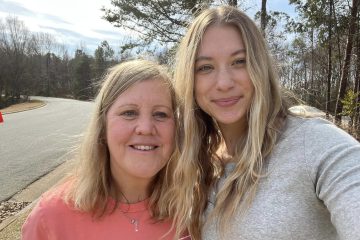We are a Gospel-centered pro-life ministry. This means we believe abortion will not end without a knowledge of and turning to Jesus. Abortion is a heart issue and a grievous sin that is often the culmination of many poor and sinful choices. The only answer to sin is the Gospel.
We are often asked how to respond when the person we are trying to convince claims no belief in God. There are many compelling arguments from a strictly scientific/humanitarian point of view. I will ALWAYS introduce God into the equation but often use the following points to springboard ultimately into a God discussion.
Abortion Harms Women
Nonetheless, science supports our stance that abortion is destructive not only to the baby but to the mothers and families as well. One of the best articles I have found that points out the devastation in the wake of abortion is cited below. The major points of that article as listed under the major categories of disrupted lives following abortion.
From compasscare.info/health-information/abortion/abortion-risks-and-side-effects/
Breast Cancer
Studies show that abortion increases a woman’s risk of breast cancer. A 2013 analysis revealed a 44% increased risk of breast cancer among females who had at least one induced abortion. The relative risk increased to 76% and 89% for those who had at least two or three abortions, respectively. 10
Often women considering abortion are experiencing their first pregnancy. It is important to note the protective effects of a woman’s first full-term pregnancy, which causes breast cells to mature. “Among women who have given birth, an increasing number of full-term pregnancies was associated with a statistically significant decrease in the risk of breast cancer; risk was reduced by 14% for each additional birth.” 11
STDs and Pelvic Inflammatory Disease
“The presence of Chlamydia in the cervical canal at the time of abortion in asymptomatic women increases the risk of post-abortal PID.” 12
Of patients who have a chlamydia infection at the time of abortion, 23% will develop PID within 4 weeks. 13,14,15,16
“PID can lead to serious consequences including infertility, ectopic pregnancy (a pregnancy in the fallopian tube or elsewhere outside of the womb), abscess formation, and chronic pelvic pain.” 17
Mental Health
Research suggests that women who have had abortions may be at increased risk for mental health problems. 18
“Women who had undergone an abortion experienced an increased risk of mental health problems, and nearly 10% of the incidence of mental health problems was shown to be attributable to abortion.” 19
Some women who have experienced an abortion report symptoms similar to Post Traumatic Stress Disorder. 20 Some of those symptoms may include:
Regret
Grief
Sadness/Depression
Anxiety
Guilt/Shame
Suicidal thoughts
If someone has had an abortion and is experiencing any of the above symptoms, it is important for her emotional and physical health that she not ignore them. She should seek referral to a licensed counselor.
Infertility and Future Childbearing
Complications that can arise from induced abortion, such as infection and damage to the uterus, can lead to infertility and increased risks of future childbearing.
In the case of medical abortion, the risks for these complications are increased in women who have a high risk of uterine rupture; an intrauterine device (IUD) in place; uncontrolled high blood pressure; diabetes, certain heart or blood vessel diseases; severe liver, kidney or lung disease; take a blood thinner or certain steroid medications; or smoke heavily.21
First-trimester surgical abortion by dilation and curettage (D&C) “can result in uterine synechiae (or Asherman’s Syndrome), which increase the risk of subsequent midtrimester spontaneous abortions and low birthweight deliveries.”22 Incompetent cervix is also a preterm birth risk associated with surgical abortion. “Symptoms related to cervical incompetence were found among 75% of women who undergo forced dilation for abortion.”23
Abortion and Sexual Dysfunction
Some women experience sexual dysfunction after an abortion.24 The following issues can often be associated with early pregnancy termination:
Increased vaginal dryness
Decreased sexual desire
Loss of orgasm ability
Dyspareunia (painful intercourse)
Using logic of why we should protect the vulnerable
From a strictly human perspective, taking God out of the equation, there are some fundamental truths most people would agree upon.
Murder is wrong. Murder is the intentional taking of an innocent human life. The pre born baby is human from the moment of conception with all the human DNA she will ever have. The baby is innocent. The baby is alive, growing and developing with a beating heart as early as 17 days from conception. Abortion is an intentional destruction of the little human life. Therefore, abortion is murder.
All societies should protect the vulnerable who cannot protect themselves. The unborn baby cannot protect herself. She is the most vulnerable human being. No society should prey upon vulnerable human beings. The worst atrocities in human history are exactly THAT. Abortion preys upon vulnerable human beings. Society should protect the unborn.
Human Design
Women are designed to bear children. The womb is designed to protect and nurture a child. The hormones of pregnancy are designed to protect the child. The first and most basic human bond is between a mother and her child. To sever that bond is unnatural.
Human Rights
Human right to life is described in our founding documents as inalienable. They are not given, nor taken away. They are bestowed upon us because of our humanity. The right to life is the most basic right upon which all other rights are based. If any people group is denied the right to life for any reason, ultimately whoever is choosing to destroy another people group will find a reason to destroy other people groups. It is what happened in Nazi Germany. The Jews. The Handicapped. The Homosexuals.
Devaluing ANY human life the right to live has a devastating effect on a society.
The mass shootings from gunmen at younger and younger ages is an example of a growing lack of understanding and valuing all human life.
What DOES Give us Value?
The SLED Method
The SLED method is an acronym of logical ways to argue for the baby’s right to life.
Size
- Size does not determine value. A small child is no less worthy of life than a large child.
Level of development
- Humans are all at varying stages of development. The brain is not fully developed till age 30! Should we be allowed to kill people up to age 30 till development is complete?
Environment
- Where we live does not determine value. NC residents are no more valuable than SC residents. The same is true of people in the womb or out of the womb.
D: Dependence
- Babies are dependent on their mothers for many years. Does their value change as they grow less dependent? What about old people dependent on caretakers? Has their intrinsic value decreased?
Raising these questions almost always leads to a discussion of God. Is our value because we are loved or wanted? What about the unloved and unwanted? Is our value based on our dependence or independence on others? What about the handicapped or the elderly? Have they lost value as they age? Is our value based on where we live? Why should those that reside in the womb be valued differently from those who reside outside the womb? Is our value based on our development? A person does not fully develop neurologically until around age 30 when the neurons to the frontal lobe are fully myelinated. Do we have less value until age 30?
If our value is based on some inherent value of all humanity…WHY?
The Bible answers that. We are of value because we are made in the image of God. From there, I can almost always engage in a discussion that includes God in why we should not kill unborn people.



0 Comments